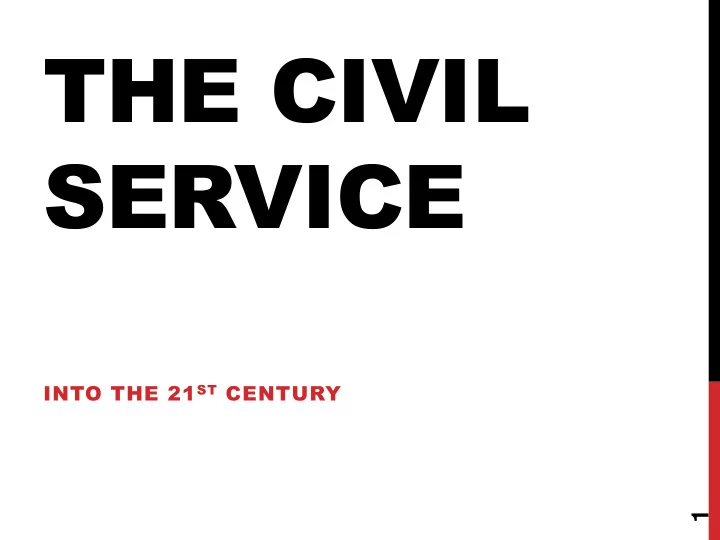

THE CIVIL SERVICE INTO THE 21 ST CENTURY 1
WHY DOES IT MATTER? THE CIVIL SERVICE AND THE CONSTITUTION THE SCALE OF THE CIVIL SERVICE THE CIVIL SERVICE IMPACT ON SOCIAL AND ECONOMIC WELFARE 2
WHAT DOES IT DO? Advises Ministers on policy and legislation Manages public services Oversees expenditure Collects taxes 3
HOW IS IT ORGANISED? 24 ministries 300 agencies 500,000 staff Who are they? 40 permanent secretaries 50,000 senior civil servants 400,000 executive and clerical staff 4
WHO RUNS IT? Ministers – all career politicians or from the House of Lords take major decisions Senior civil servants – career professionals develop and implement policy Agency CEOs - manage executive operations on policy set by ministers and senior civil servants 5
EXPENDITURE The Civil Service is responsible for: tax collection defence direct transfer payments: pensions, welfare, payments by public services: education, health other government policies : transport, agriculture etc Total annual expenditure for central government c £750billion 6
PUBLIC SERVICES Other organisations, established by law are funded and regulated by the civil service – directly or indirectly: eg Quangos, Non Departmental Public Bodies, Public Corporations Research Councils Regulators - and elected Local Authorities 7
THE CIVIL SERVICE AND THE CONSTITUTION The Civil Service is the permanent centre of Government. Its primary role is to maintain the Queen’s government. The Cabinet Office will deal with Constitutional difficulties e.g. coalition government Senior officials are responsible for expenditure as Accounting Officers The Cabinet Secretary handles disagreements between politicians and civil servants. 8
MOVING FROM CONVENTION TO REGULATION Legislation in 2010 established principles of Civil Service work: Career civil servants should act with integrity, honesty, impartiality and objectivity. The Cabinet Office maintains a Code of conduct for Ministers: Establishing how ministers should behave and deal with conflicts of interest Ministers can do very little without the Civil Service 9
POWER IS DIVIDED Decisions have to be taken formally by Ministers Ministers can take no action without the Civil Service – they do the implementing. Civil Servants can do little without express or implied decisions from Ministers. They need agreement Civil Servants can stop Ministers spending, they are accountable for the money. Ministers are accountable to Parliament for the policy – but not the expenditure. 10
WHAT DOES THE FUTURE LOOK LIKE? Difficult phase: uncomfortable political outlook Different staff Sharp decreases in funding Pressure to change structure and skills of CS Push from potential of digital operations 11
POTENTIAL OF DIGITAL TRANSACTIONS Pace and possible scale of ‘digital government’ Service delivery Communications Cost reductions Better data 12
HOW FAR CAN DIGITAL TRANSFORMATIONS GO? Debate: Role and structure of departments Shift policy making from head office to front line What happens informs decisions directly – and changes solutions Alters the balance of political debate 13
WHAT WOULD YOU DO? How much value is there in the theories of public management in such a changing situation? Does it make sense to move fast to take the digital possibilities or should the public service go carefully? Does this alter the role of the traditional generalist policy maker? Do we fuss too much about probity? Is there really a digital revolution? 14
Recommend
More recommend